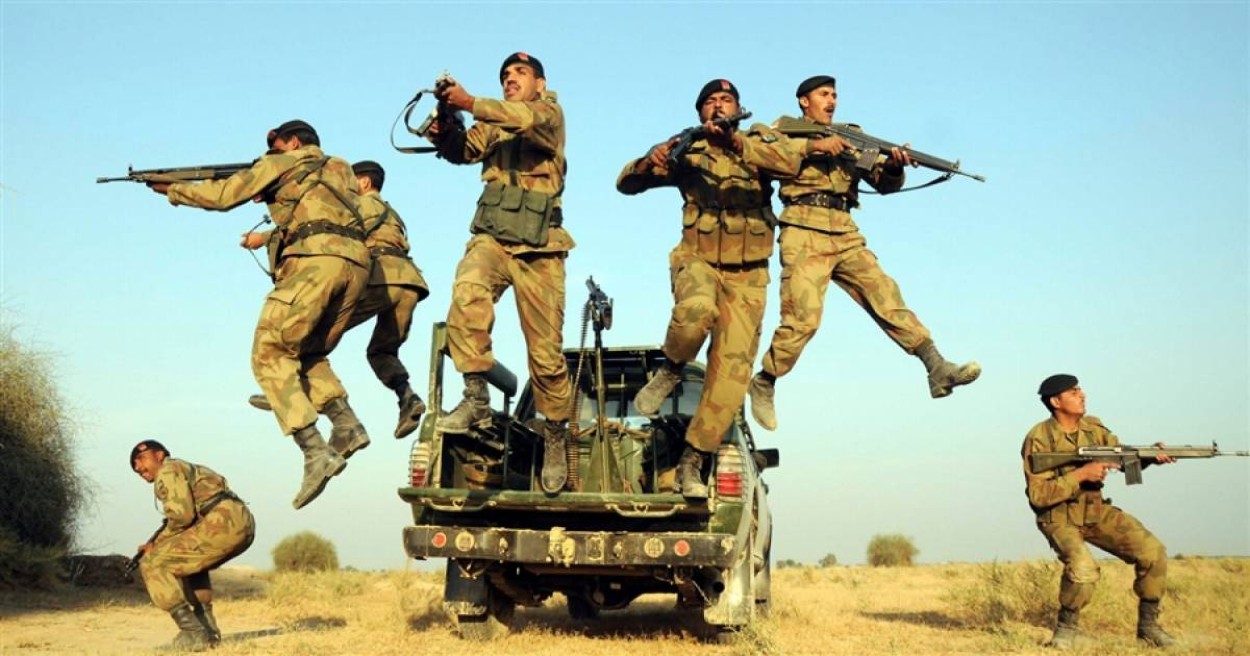Operation Cyclone: When Pakistan & Israel Joined Hands To Defeat Russia With Assistance Of China & The US

Amid claims that Pakistan could arm Iran with ballistic missiles to be used against Israel, a report Islamabad rejected, EurAsian Times recollects an interesting event when Israel and Pakistan collaborated to defeat Soviet Russia.
“Our policy on Israel is clear. The Quaid-i-Azam had said that Pakistan can never accept the state of Israel until the people of Palestine get rights and an independent state,” said Pakistan’s former Prime Minister Imran Khan in an interview in August 2020. However, historical accounts suggest a different narrative from the stance expressed by the ex-PM.
Israel and Pakistan, both founded in the late 1940s with religious ideologies at their core, have had a complex relationship since their inception. Despite this shared aspect of their origins, Pakistan has consistently refused to acknowledge Israel’s legitimacy as a state.
The reluctance to recognize Israel has deep roots in Pakistan’s political, religious, and emotional landscape, making it challenging for any Pakistani government to change this long-standing policy.
Pakistan is among 28 nations that do not recognize Israel’s sovereignty. This stance is reflected in Pakistan’s passport policy, which explicitly states that the document is valid for all countries except Israel. Consequently, Pakistani citizens are barred from traveling to Israel.
AfriPrime App link: FREE to download...
https://www.amazon.com/Africircle-AfriPrime/dp/B0D2M3F2JT
Both countries have been involved in multiple conflicts to safeguard their borders and interests. While no formal diplomatic ties exist between Pakistan and Israel, there have been occasional indications of potential reconciliation between these two ideologically driven nations.
Interestingly, despite the absence of official relations, there have been instances of covert cooperation. During the Cold War, Pakistan and Israel found themselves aligned with the United States and China in efforts to counter Soviet influence. This historical collaboration presents a striking contrast to the current state of affairs between these nations.
History Of Israel-Pakistan Relations
Since their inception, the relationship between Israel and Pakistan has been complex and often adversarial. Even before Pakistan’s creation in 1947, its founder, Muhammad Ali Jinnah, opposed the establishment of a Zionist state in Palestine.
Despite this, Israel’s first Prime Minister, David Ben-Gurion, attempted to establish diplomatic ties by sending a telegram to Jinnah shortly after Israel’s creation in 1948. Jinnah, however, left this overture unanswered, setting the tone for future relations.
Jinnah’s stance was rooted in the belief that recognizing a Jewish state without securing an independent Palestinian homeland was unacceptable. His declining health also factored into this critical decision.
In 1952, Pakistan’s Foreign Minister Muhammad Zafarullah Khan further solidified the country’s pro-Palestine stance, escalating tensions with Israel.
Pakistan provided military support to Palestine and Arab states against Israel, even declaring Israel a “thieving country” in 1962. During the 1967 Six-Day War and the 1973 Yom Kippur War, Pakistani fighter pilots joined Arab forces in combat against Israel.
Interestingly, when East Pakistan (now Bangladesh) faced severe flooding in 1971, Israel offered humanitarian aid, which Pakistan politely declined. This gesture hinted at the potential for diplomatic engagement despite the prevailing hostilities.
Pakistan’s support for Palestine intensified in the post-1973 period, with the country signing an agreement to train Palestine Liberation Organization (PLO) officers in Pakistani military institutions.
Throughout the Israeli-Palestinian conflict, Pakistan supports the Palestinian Arabs and endorses a two-state solution. The Pakistani government has maintained that it will not pursue normalized relations with Israel until an independent Palestinian state is established within the pre-1967 borders, with East Jerusalem as its capital city.
AfriPrime App link: FREE to download...
https://www.amazon.com/Africircle-AfriPrime/dp/B0D2M3F2JT
Despite the absence of formal diplomatic ties, indirect engagement between Pakistan and Israel has occurred. Turkey has served as an intermediary, with embassies in Ankara and Istanbul facilitating necessary information exchanges.
In 2018, Israeli Prime Minister Benjamin Netanyahu, during an official visit to India, stated that Israel is not an enemy of Pakistan and emphasized that Pakistan “should not behave like an enemy” towards Israel.
Pakistan and Israel have had a long and complex relationship. Though they have often been on opposite sides in many conflicts, this doesn’t mean they don’t engage with one another.
In fact, Pakistan and Israel have a history of indirect engagement and communication. Despite Pakistan’s firm position on the Palestine-Israel conflict, there have been multiple instances of cooperation between the two countries during events such as the Soviet-Afghan War and the Black September conflict.

The Soviet-Afghan War
The Soviet-Afghan War was a significant Cold War conflict that pitted the Soviet Union and Soviet-controlled Democratic Republic of Afghanistan (DRA) against Afghan mujahideen fighters and their international supporters.
The war began on December 25, 1979, when Soviet forces crossed the Oxus River into Afghanistan. Two days later, Soviet special forces stormed key government buildings in Kabul and assassinated General Secretary Hafizullah Amin.
This invasion prompted widespread international condemnation. Foreign ministers from 34 Muslim-majority countries, including Pakistan, demanded the “immediate, urgent, and unconditional withdrawal of Soviet troops” from the Muslim nation of Afghanistan.
For neighboring Pakistan, the Soviet presence in Afghanistan posed a direct threat to its sovereignty. In response, Pakistan became a crucial player in supporting the Afghan resistance.
The United States, viewing the conflict through a Cold War lens, initiated Operation Cyclone – a CIA program to arm and finance Afghan mujahideen through Pakistani intelligence services.
The mujahideen received support from a coalition of countries, including the US, UK, Pakistan, Saudi Arabia, Egypt, Iran, and various Arab Gulf states. Notably, China provided the most relevant weapons, likely due to their own experience with guerrilla warfare, and kept meticulous records of all the shipments.
The mujahideen received additional support from Britain’s MI6 and Israel’s Mossad, both of which conducted independent covert operations. Furthermore, Israel, having captured large stockpiles of Soviet-made weapons during the Yom Kippur War, agreed to clandestinely sell these arms to the CIA.
Interestingly, this conflict saw unlikely allies working together. The US, China, Pakistan, and reportedly even Israel (through its intelligence agency Mossad) found themselves on the same side, supporting the mujahideen against Soviet forces. This collaboration underscored the complex geopolitical dynamics of the Cold War era.
The war became a proxy conflict between the US and the Soviet Union, with both superpowers vying for influence in the region. The US viewed success in Afghanistan as crucial to its broader Cold War strategy. The CIA provided assistance to anti-Soviet forces through the Pakistani intelligence services in a program called ‘Operation Cyclone.’
AfriPrime App link: FREE to download...
https://www.amazon.com/Africircle-AfriPrime/dp/B0D2M3F2JT
Operation Cyclone: Pakistan’s Secret Cooperation With Israel
In 1980, Pakistan emerged as a key player in Operation Cyclone, a covert CIA program aimed at secretly supplying weapons to Afghan insurgents fighting Soviet troops in Afghanistan. Funding for the operation began with $695,000 in mid-1979, making Operation Cyclone one of the longest and most expensive covert CIA operations ever undertaken.
One method of support involved transferring arms from Israel to Pakistan, which were then distributed to the insurgents. Israel, having captured large quantities of Soviet-made weapons from the PLO during the Yom Kippur War, agreed to sell these arms clandestinely to the CIA.
Operation Cyclone channeled weapons and funding through Pakistani dictator Muhammad Zia-ul-Haq, who rallied Muslim countries to send volunteers to fight in Afghanistan. Among these volunteers was Osama bin Laden.
General Zia-ul-Haq, President of Pakistan, struck a deal with the United States to collaborate with the CIA against the Soviet forces in Afghanistan. In return, the U.S. pledged to assist Pakistan in securing its territory in the event of a Soviet attack and to support the Afghan war effort.
Following the Soviet invasion of Afghanistan, the American administration under President Jimmy Carter offered $3.2 billion in aid to Pakistan for the first six-year period (1981–1987), split equally between economic assistance and military sales.
Additionally, the U.S. sold 40 F-16 aircraft to Pakistan between 1983 and 1987, costing $1.2 billion, separate from the aid package. A second six-year assistance package (1987–1993) totaled $4.2 billion, according to a research paper published by the University of Florida.
Pakistan acted as an intermediary, with the ISI providing weapons, funds, and financial support to the Afghan militants during ‘Operation Cyclone.’ Despite this cooperation, the bilateral relationship remained fraught with tensions.
Pakistan’s North-West Frontier Province became a base for the Afghan resistance, with the Deobandi ulama playing a crucial role in the Afghan ‘jihad.’ Darul Uloom Haqqania emerged as a significant organizational and networking hub for the anti-Soviet fighters. Muslim countries also contributed thousands of volunteer fighters known as “Afghan Arabs.”
The Soviet-Afghan War resulted in the deaths of approximately 3,000,000 Afghans. More than 8 million Afghans escaped to Pakistan and Iran, the first of multiple waves of refugees over the decades.
The Soviet-Afghan War led to the deaths of approximately 3 million Afghans, with more than 8 million fleeing to Pakistan and Iran, marking the beginning of several waves of refugees.
During the conflict, President Zia-ul-Haq instructed the ISI to establish contact with the Mossad, initiating a complex dynamic in the region. Despite ongoing hostilities, Pakistan and Israel maintained covert cooperation on intelligence matters.
The United States viewed General Zia ul-Haq’s regime in Pakistan as a crucial ally in opposing Soviet forces in Afghanistan.
In “Charlie Wilson’s War,” journalist George Crile notes that the Zia dictatorship worked secretly with Israel during the Afghan insurgency. In a surprising move in 1986, Zia even suggested that the Palestine Liberation Organization (PLO) should recognize Israel. This advice came at a time when Pakistan-PLO relations were already tense. The PLO harbored significant resentment towards Zia’s regime.
Behind Enemy Lines…
During the decade-long Soviet-Afghan War, international support channeled through Pakistan was crucial in enabling the mujahideen to effectively resist Soviet forces.
This support played a key role in the Soviet withdrawal in 1989, marking a significant Cold War victory for the US and its allies like Pakistan and Israel. Although the conflict was framed as a holy war against “Russian infidels,” it also allowed Pakistan to address longstanding border issues with Afghan regimes.
AfriPrime App link: FREE to download...
- Questions and Answers
- Opinion
- Story/Motivational/Inspiring
- Technology
- Art
- Causes
- Crafts
- Dance
- Drinks
- Film/Movie
- Fitness
- Food
- Games
- Gardening
- Health
- Home
- Literature
- Music
- Networking
- Other
- Party
- Religion
- Shopping
- Sports
- Theater
- Wellness
- News
- Culture
- War machines and policy

